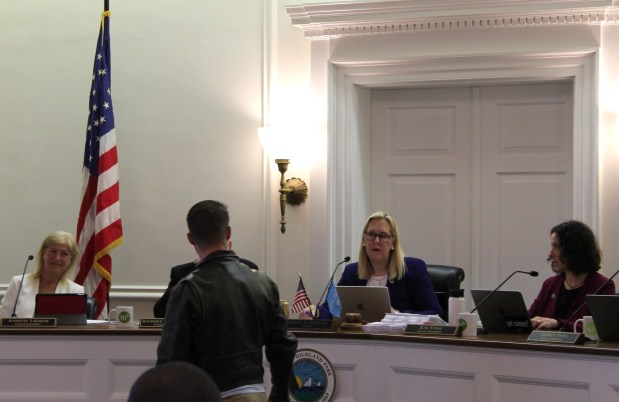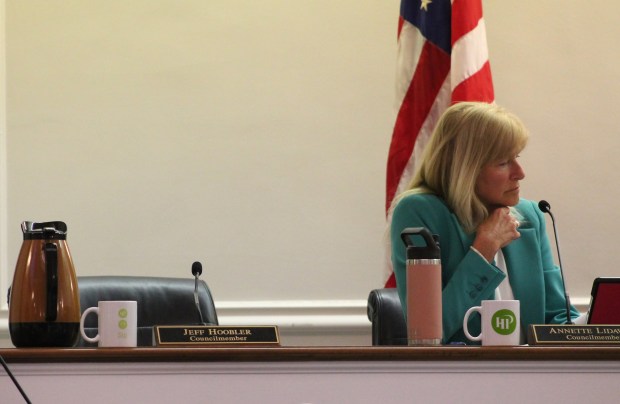In another attempt to amend Highland Park’s liquor code and keep Councilman Jeff Hoobler in his elected position, a group of residents rallied ahead of the Wednesday night City Council meeting and requested that it hold a special meeting before the end of the month to reconsider the issue.
A city law prohibits liquor permits from being issued to elected officials or law enforcement officers. Without an amendment to the code, Hoobler, who is co-owner of the Ravinia Brewing Company, has said he will resign at the end of the month.
“Someone with a liquor license is not an inferior person,” Hoobler said to his supporters at the rally. “A restaurant owner with a liquor license should be allowed to serve. The wife or husband of a restaurant owner should be allowed to serve.”
More than 40 residents gathered in front of City Hall in support of amending the city’s liquor code, which some feel is “antiquated,” doesn’t serve a public interest and that by not amending it, the council is disenfranchising those who voted for Hoobler.
Though an amendment to the liquor code was not on the council’s agenda, about a dozen people – including Hoobler’s wife, Athena, and son, Lucas – still urged the council during public comment to change the code. A few asked for a special meeting, and one suggested a referendum on the issue.
“By enforcing this outdated law, you’re not only removing my father from the council, you’re sending a message that you value bureaucracy over progress, that you prioritize archaic regulations over the well-being of your constituents,” Lucas Hoobler told the council.
Mayor Nancy Rotering reiterated earlier statements from a February meeting, when the council was first faced with the potential liquor amendment.
“If we change a law for a City Council member, then what’s the point of having laws?” Rotering said during Wednesday’s meeting. “By not amending the law, we show that laws apply equally to all residents, including elected officials, and I cannot support an effort by elected officials who simply want to change the law for their personal preference.”
City Manager Ghida Neukirch said the state municipal code allows for a special meeting to be called if there is support from the mayor or three council members. It would require 48 hours advance notice and an agenda.
As of Wednesday evening, Neukirch had not received any request for a special meeting. The next regular City Council meeting is May 13.
“We no longer have the option to vote and correct this wrong before Jeff leaves office,” said Councilwoman Annette Lidawer, who suggested revisiting the liquor code during the April 24 meeting. “Your vote for Jeff Hoobler is being ignored, and the only conclusion is that the personal views of members of this council may have taken away his right to serve.”
Voters aware of Hoobler’s license
Once a statewide law that was amended by the Illinois General Assembly, the law in Highland Park only recently came to the attention of city officials and the public regarding Hoobler’s position on the council.
Elected to the council in 2023 as the top vote-getter, Hoobler also holds a liquor license for Ravinia Brewing Company, a local craft brewery in the Ravinia neighborhood district of Highland Park.
During the rally and public comment, many of his supporters said they were well aware of his restaurant affiliation and liquor license, and didn’t see it as an interference with his ability to serve.
In December, his liquor license renewal was approved by Rotering, who also serves as the city’s liquor control commissioner.
But, debate around Highland Park’s liquor code didn’t start until a February council meeting, when an amendment to change the liquor code was on the council’s agenda. During that meeting, Rotering said, “a mistake may have been made.”
A tie vote rejected the motion and the law remained as is, forcing Hoobler to choose between his position on the council and his business operation.
“No one knew the ordinance at the time of Jeff’s election, not even the city manager or the lawyer, yet only one person, Jeff Hoobler, is being held accountable,” Athena Hoobler said during public comment. “The three of you that serve on the Liquor Commission and approved the license are not only ducking your accountability, but you’re also the three who voted against the amendment, making Jeff a scapegoat. This is incredibly wrong.”
Since then, members of the public, local restaurants, businesses and the Illinois Restaurant Association have voiced their disapproval of the council’s reluctance to change the law.
A public records request revealed more than 300 pages of emails in support of the liquor code amendment.
At a council meeting two weeks ago, Rotering said there has also been support of the council’s action to not amend the liquor code.
“Somebody did come by, and we have received a handful of emails and a lot more phone calls,” she said. “There is a sense that the people who are in support are feeling intimidated, and they don’t want to be called out by the public.”

There was one public comment opposing the amendment at the meeting on Feb. 12, and another on Wednesday evening. A request for emailed comments from the News-Sun found three additional emails supporting the council’s decision to keep the law as written as of April 10.
“Changing an ordinance for the benefit of a sitting council member who is in violation would greatly compromise the integrity of the City Council,” wrote one constituent in an email to Councilman Anthony Blumberg.
The state’s Liquor Control Commission is investigating Hoobler’s license, according to Neukirch.
State law changed in 2001
The license-holder law that’s on the books in Highland Park comes from a post-Prohibition Illinois law.
But in 2001, the state amended the Liquor Control Act to allow liquor licenses for elected officials and law enforcement in cities with a population of 50,000 or less, provided that the establishment has food service. In 2013, it was amended again for populations of 55,000 or less.
To prevent any conflict of interest, the state law specifies the elected officials, “shall not participate in any meetings, hearings or decision on matters impacting the manufacture, sale or distribution of alcoholic liquor.”
State records from the amendment to the Liquor Control Act stated the sponsor explained the purpose was to address, “an inherent disconnect that prohibited business owners that held a liquor license, but no other type of business owner, from becoming an elected official.”
The 2001 amendment passed unanimously in the Illinois Senate. Sen. Denny Jacobs, D-East Moline, introduced the bill and said it was brought to the legislature by the Illinois Restaurant Association and there was “no known opposition,” according to Illinois Senate transcripts.
Since the state’s amendment, some municipalities in Illinois have changed their local laws, including at least eight cities near Highland Park, such as neighboring Highwood, according to a 50-city study conducted by Highland Park’s corporation counsel.
Moving forward
Since February, the Highland Park City Council voted to expand classifications of liquor licenses, creating options for bring-your-own-beverage, ancillary liquor service, to-go cocktails and more. Lidawer said the council’s refusal to amend the liquor license requirements is incongruent with expanding the types of liquor permits offered.

“There are other business people who are not able to seek local public office because of our actions,” Lidawer said during Wednesday’s meeting. “We expanded the potential number of liquor license-holders in this community at the last meeting. Think about that. We expanded the business opportunities in Highland Park while contracting the number of citizens who can hold public office in Highland Park.”
In response to alleged ethical issues with Hoobler holding a liquor license while on council, the City Council is considering creating an ethics office, with an ethics advisor and ethics enforcement officer, according to a Committee of the Whole discussion on April 24.
The office would be responsible for providing guidance to city elected and appointed officials in advance of a meeting or situation when ethics guidelines might apply. The office would also be tasked with adjudicating alleged violations of the ethics guidelines.
During Wednesday evening’s rally, though he is planning to resign, Hoobler said he is not going away. The business owner plans to start a political action committee with two main objectives: to amend the “archaic law,” and to help get candidates elected to the council.
“We must use the power of our vote,” Hoobler said. “Today is not the end, it’s just the beginning.”
chilles@chicagotribune.com





